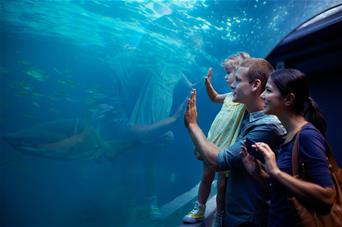- 877.684.1613
- Schedule a Tour
 Toys can be valuable tools that teach children about themselves and the world. While most playrooms are filled to the ceiling with toys, many education experts actually believe that having a smaller amount of toys is more beneficial to children.
Toys can be valuable tools that teach children about themselves and the world. While most playrooms are filled to the ceiling with toys, many education experts actually believe that having a smaller amount of toys is more beneficial to children.
With the holidays quickly approaching, parents are thinking about gifts. As a parent, you want to give your children the things you may not have had. However, there are many reasons why giving fewer toys is a great gift to your children! Here are some things to consider:
- If there’s more than one child at home, there tends to be less arguing if there are fewer toys to fight about. In most cases, siblings with fewer toys are compelled to share and cooperate. This helps them learn determination and patience.
- Fewer toys can result in children becoming more resourceful by solving problems using only readily available items and materials. They’ll begin to use things from their surroundings to invent games and cultivate their imagination and creativity.
- Having a large number of toys can negatively affect attention spans. It’s difficult for a child to appreciate a toy in front of them with numerous other choices. Instead of using problem-solving skills when they’re frustrated, they just drop the toy to choose another.
Rather than buying toys that will probably end up on the floor of the playroom, consider things that will provide experiences. Give the gift of lessons that will pique their individual curiosity. Drawing or painting lessons for the art lover, piano or singing lessons for the music lover, or golf, gymnastics, or swimming lessons for the sports lover.
Do you have a child who loves animals? Instead of buying a toy stuffed animal, take them to the zoo or aquarium, or purchase a season pass so they can see the animals live. Tickets to a sporting event, a play, the opera, or the movies can also afford memories that last forever.
Subscriptions to a magazine or monthly craft or science kit are also sound choices, not only because your child uses their imagination while learning, but they also receive the best gift—the gift of time together. Years from now, they probably won’t remember the plastic toy they received for their third birthday, but they’ll have memories from a day roller skating in the park.
So, if you’re overwhelmed with the amount of toys and “stuff” that your child has, consider non-toy gifts! Here are a few more ideas below to get you started.
- One-time passes to the movies, bowling, theater, sporting event, circus, roller skating, mini golf, or a concert
- Season passes to a zoo, aquarium, museum, aviary, or botanical garden
- Child-selected experience such as a train ride, special dinner out, manicure, or trip to the arcade
- Class or lessons such as swimming, gymnastics, dance, karate, musical instrument, pottery, painting, crafting, etc.
- Gifts that aren’t toys, including books, board games, DVDs, CDs, craft kits, science kits, magazine subscriptions, a journal, roller skates, swing set, bedroom decor, scooter, etc.
- Learning tools such as magnifying glass, magnets, cookbook and supplies, easel, gardening tools, binoculars, etc.
- Other ideas include building a bird house, educational apps or computer games, dress-up clothes, or restaurant gift cards
